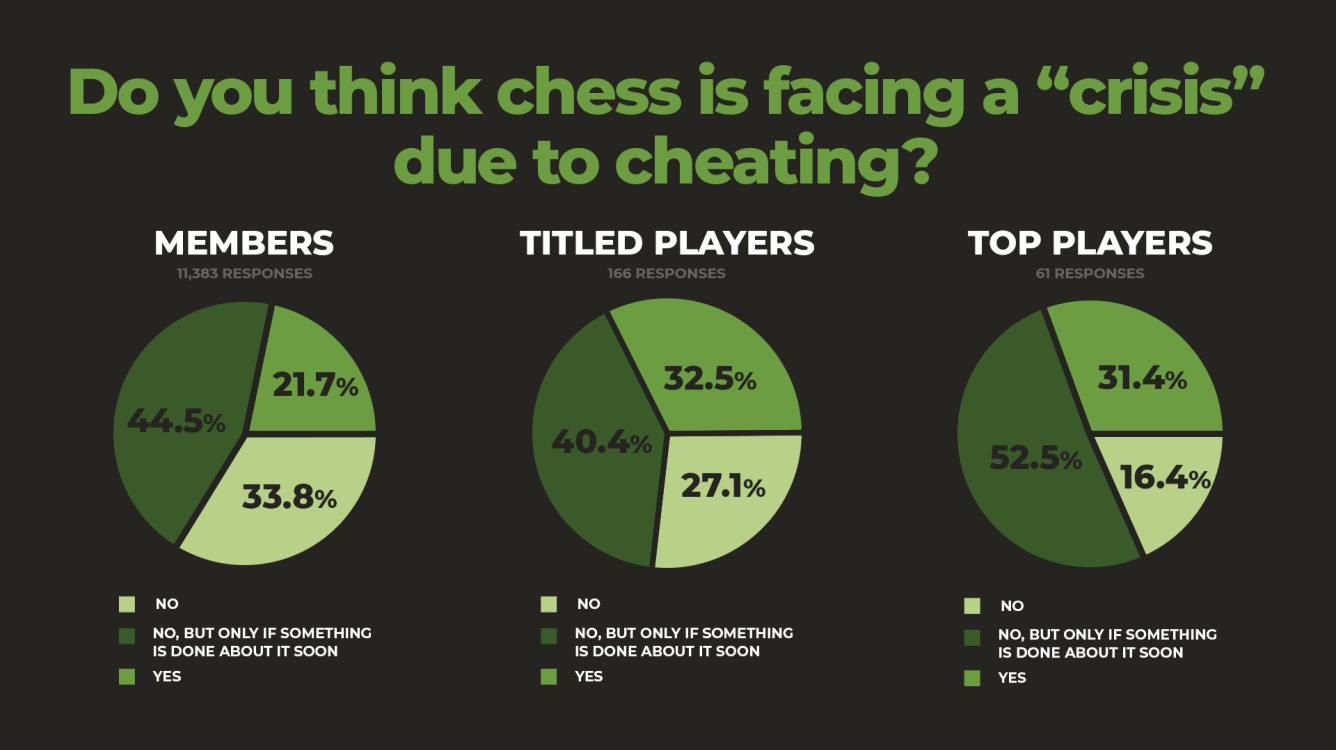
Fair Play Survey Results
Ensuring fair play and protecting the integrity of the game is a priority for Chess.com. We believe that our members should have a voice in how we handle cheating in chess, and in an effort to understand the community's sentiments better, we shared a fair play survey with three groups: members, titled players, and top players (the top 100 players overall as well as the top 20 women players by FIDE rating). We received 11,383 member responses, 166 titled-player responses, and 61 responses from top players.
Perhaps the most immediate insight is that on many important questions, the community is very divided. Cheating in chess is a complex problem, and there are no easy answers. We have tried to identify some useful insights from the responses and have shared them below. The full survey results are included here, and we welcome further comments and insights.
On Second And Third Chances And Suspensions
Most people believe that there should be a second chance available to casual players who are caught cheating, but a majority of respondents don't believe that they should receive a third chance. There is a minority that does support third chances for casual players.
Most people agree that titled players should be given a second chance if they are caught cheating in casual games if they admit to it. Interestingly, members are very hard on titled players caught cheating in prize money events and favor a ban on the first offense.
Titled players supported a suspension period before casual players caught cheating could open a second account, but there was no clear agreement on how long that suspension should be.
On Reporting Online Cheating To FIDE/Federations
Most members don't think that federations such as the US Chess Federation should be informed if a member is caught cheating on a first offense, but most do think that federations should at least be informed on a second offense. Most top players think that offenses should be reported, even first offenses.
A majority think FIDE should always be informed of cheating, even when it's the first time in online play, and everyone agrees FIDE should be informed of OTB cheating by titled players.
On A Public Ban List
A slim majority thinks that titled players cheating online should be disclosed publicly on the first offense. Most agree they should be disclosed publicly after a second time, but opinions regarding publicizing bans were very split.
On Cheating Over The Board
Most people think there is very little cheating in OTB, but nearly everyone agrees that cheating over the board, even once, should be reported. In general, the higher rated the respondent, the more important they felt OTB was compared to online, regardless of prizes. In general, though, players felt the importance of OTB and online chess was equal or dependent on prizes.
When playing over-the-board against a player deemed suspicious, most people believed that you should inform the organizer and possibly FIDE as well, but a minority supported refusing to play the suspicious opponent.
Cheating By Minors
While respondents generally agreed that kids should get extra chances if they are caught cheating, there were very different opinions on the age at which a player should be considered a "kid."
Is Cheating A Crisis?
Perhaps the most heartening insight from the survey was that most respondents don't see cheating as a crisis that threatens the game, though many felt that it was important to act quickly to ensure that the present context doesn't develop into a true crisis.
Most respondents did feel that Chess.com was doing a good job addressing cheating but that there is clear space for improvement. Respondents did feel that chess federations and organizers could do a better job of addressing cheating.
Thank you to everyone who completed the survey. These perspectives are important to us as we continue to improve our fair-play policies and try to address the complex problem of cheating in chess.
